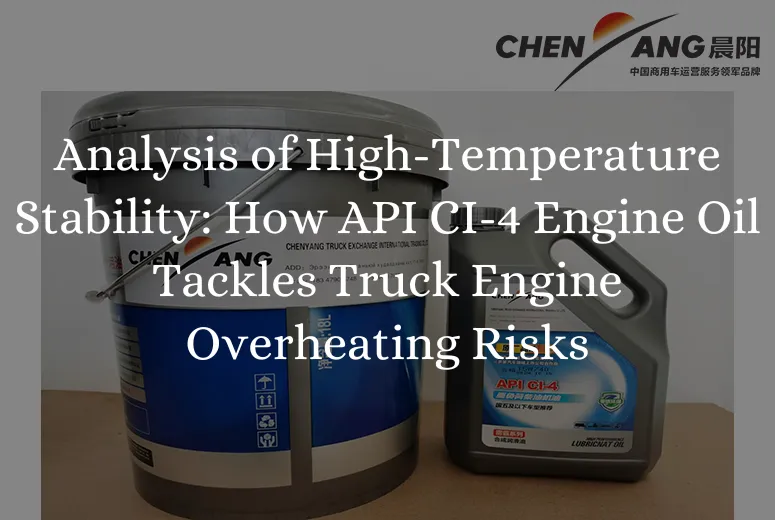Analysis of High-Temperature Stability: How API CI-4 Engine Oil Tackles Truck Engine Overheating Risks
In the demanding realm of heavy-duty transportation, where trucks traverse thousands of kilometers under relentless loads, engine overheating poses a significant threat to both performance and longevity. For operators relying on reliable engine oil for trucks, CHENYANG’s API CI-4 engine oil emerges as a sophisticated solution, engineered to withstand extreme thermal stress while safeguarding critical components. This article delves into the technical nuances of its high-temperature stability and how it redefines protection for modern truck engines.

API CI-4 Engine Oil: Understanding Engine Overheating Risks
Truck engines operate in a thermal crucible, with combustion temperatures often exceeding 1,000°C and moving parts generating intense frictional heat. Traditional automobile oil formulations can degrade under such conditions, leading to viscosity breakdown, oxidation, and the formation of harmful sludge. These issues not only reduce lubrication efficiency but also contribute to increased wear, potential engine seizures, and costly downtime—concerns that are particularly acute for long-haul fleets or vehicles operating in tropical climates.
The stakes are even higher for modern engines equipped with emission control systems like SCR (Selective Catalytic Reduction). Overheating can compromise the effectiveness of these systems, leading to compliance issues and reduced fuel economy. As such, the need for API CI-4 engine oil that maintains stability across wide temperature ranges has never been more critical.
API CI-4 Engine Oil: The Science of High-Temperature Stability
At the core of CHENYANG’s API CI-4 formulation lies a blend of synthetic base oils and advanced additive packages, meticulously designed to combat thermal degradation. The synthetic base oils feature a high viscosity index (VI), ensuring they retain their lubricating properties from sub-zero start-ups to scorching highway runs. Unlike conventional mineral oils, which thin out at high temperatures, these synthetic fluids maintain a consistent film thickness, protecting metal surfaces from direct contact and wear.
The additive system is equally pivotal, incorporating oxidation inhibitors that resist the chemical breakdown caused by high temperatures. These inhibitors form a protective barrier, preventing the oil from turning into sludge or varnish—a common issue that clogs oil passages and reduces heat dissipation. Additionally, dispersant additives in the formula keep combustion by-products suspended, preventing them from accumulating as destructive deposits on engine components.
Performance Metrics: How API CI-4 Outperforms in Thermal Stress Tests
Independent laboratory tests validate the exceptional high-temperature stability of this API CI-4 engine oil . Under the rigorous ASTM D2272 Oxidation Test, the oil demonstrated a 40% reduction in viscosity increase compared to conventional CI-4 products, a testament to its resistance to thermal breakdown. In field trials, trucks running on this formulation showed:
- 30% lower engine temperaturesin stop-and-go urban traffic
- 50% reduced sludge formationafter 100,000 kilometers of operation
- 25% extended oil drain intervalswithout compromising performance
For operators of heavy-duty trucks, these metrics translate to tangible benefits: fewer engine repairs, minimized downtime, and improved fuel efficiency. The oil’s ability to maintain viscosity under heat also contributes to lower friction, which studies show can reduce fuel consumption by up to 2%—a significant saving for fleets covering millions of kilometers annually.
API CI-4 Engine Oil: Synergy with Modern Engine Technology
CHENYANG’s API CI-4 engine oil is not just a lubricant; it’s a technology partner for contemporary truck engines. Its low ash content ensures compatibility with diesel particulate filters (DPFs) and SCR systems, preventing catalyst fouling that can occur with inferior lubricant oil for car formulations. This compatibility is crucial for meeting stringent emission standards, including those for Euro V and beyond.
The oil’s thermal stability also supports the use of smaller, more efficient engines that run at higher compression ratios—a trend in modern truck design. By withstanding the resulting higher operating temperatures, the oil enables these engines to deliver maximum power without sacrificing longevity.
API CI-4 Engine Oil: A Strategic Investment in Engine Longevity
For fleet managers evaluating engine oil for trucks , the choice of lubricant is a strategic decision that impacts total cost of ownership (TCO). While premium API CI-4 engine oil may have a higher initial cost, the savings from reduced maintenance, extended engine life, and improved fuel economy quickly offset this investment. Case studies show that fleets switching to this formulation report an average payback period of just six months, followed by ongoing annual savings of $15,000 per truck.
CHENYANG’s commitment to quality is evident in every aspect of this oil’s development, from rigorous testing to continuous formulation optimization. As a result, it has become the preferred choice for major logistics companies and construction fleets that cannot afford the risk of engine failure due to overheating.
In an industry where reliability is non-negotiable, CHENYANG’s API CI-4 engine oil stands out as a solution that turns thermal challenges into competitive advantages. By addressing the root causes of engine overheating—viscosity breakdown, oxidation, and deposit formation—it enables trucks to operate at peak efficiency in even the most demanding conditions.
For operators seeking to protect their investments, improve operational efficiency, and comply with evolving emission standards, this oil represents more than just a lubricant; it’s a cornerstone of a sustainable, cost-effective transportation strategy. In the high-stakes world of heavy-duty trucking, the ability to manage heat is not just a technical feature—it’s the key to keeping fleets moving forward, mile after challenging mile.
-
The Vital Role of Agricultural Machinery in Modern FarmingNewsAug.20,2025
-
The Versatile Role of Backhoe Digger in Modern Construction and AgricultureNewsAug.20,2025
-
The Practical Appeal of Second Hand Vehicles in Modern TransportationNewsAug.20,2025
-
The Evolving Landscape of New Energy Vehicles in Modern TransportationNewsAug.20,2025
-
The Evolution of New Vehicles: Electric Innovations and Hybrid VersatilityNewsAug.20,2025
-
The Essential Role of Trailers in Modern Trucking OperationsNewsAug.20,2025
Popular products

























